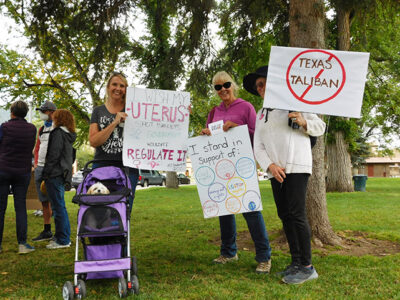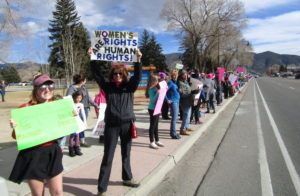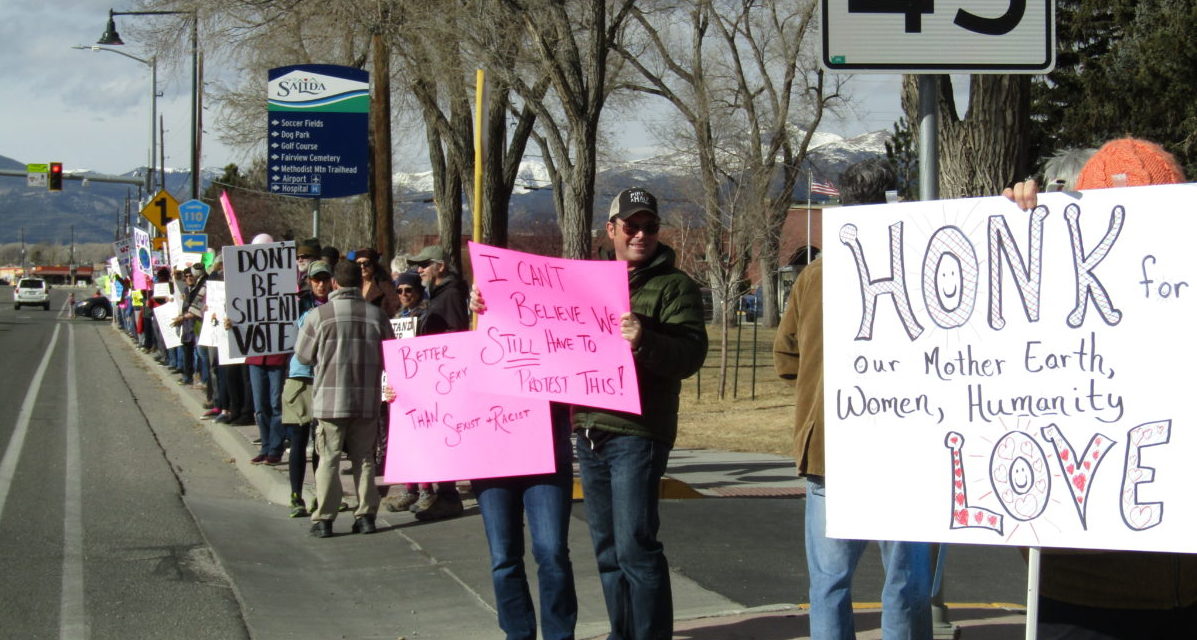In a leaked draft of a majority decision the Supreme Court of the United States (SCOTUS) published late last night by Politico and labeled as a “1st Draft” of the “Opinion of the Court, it appears poised to strike down Roe v. Wade. The 1973 decision has protected women’s right to choose whether or not to have an abortion for 49 years and has repeatedly been called “settled law.”
If the decision stands in a case challenging Mississippi’s ban on abortion after 15 weeks, in a case known as Dobbs v. Jackson Women’s Health Organization, it will immediately trigger laws in nearly half the states that will severely limit access to abortion or make abortion illegal. In 20 states new laws mirroring conservative efforts in the culture war have been introduced by Republicans, while in a few other states old laws that remained on the books but were made unconstitutional by the 1973 Roe v. Wade decision, could be reinstated.

Joining thousands of marchers and protesters nationwide, Jody Bol, Shelby Marion and Cindy Bucholz were at the Oct. 2, 2021 gathering at Alpine Park to support abortion rights. Tara Flanagan photo
The final decision was not expected for a few more months, and the early leak has been called nothing short of an earthquake in American society, with legislators and news commentators calling it “shocking”, “unprecedented”, “a life-changing moment” and an affront to both democracy and to the right to privacy. Hundreds of demonstrators gathered last night at the Supreme Court in Washington D.C. to voice their opposition, this morning joined by pro-life demonstrators.
“Never in the history of this country has a Constitutional right been taken away,” said U.S. Senator from Minnesota Amy Klobuchar, who went on to question whether the Supreme Court, was taking a serious turn into politics.
The draft of the 98-page majority decision, which appears to have been written by Justice Samuel Alito (which could indicate a 5-4 court split with Chief Justice John Roberts siding with the minority) takes direct aim at the decision. In the opening pages it calls Roe v.Wade “an egregious decision that was wrong from the start”.
The draft opinion dated Feb. 10, 2022, turns Constitutional rights upside down. The decision, related to the Mississippi case of Dobbs v. Jackson Women’s Health Organization, makes no exception for rape or incest, or even the life of the woman. In fact, it appears to ignore the right to privacy.
“I’m reeling from news regarding a leaked draft of the U.S. Supreme Court decision in Dobbs v. Jackson Women’s Health Organization,” wrote President and CEO of Planned Parenthood Rocky Mountain Action Fund Adrienne Mansanares in a message this morning. “Not only does this draft decision call for the overturning of Roe v. Wade and Planned Parenthood v. Casey, it takes aim at many other rights we have thought protected–our critical rights to access birth control as well as our freedom to marry, freedom to love, freedom to live full lives. I am outraged to my core by the hateful, scathing message this draft sends and its arrogant posturing with its stigmatizing language.

A crowd of around 450 from as far away as Leadville and metro Denver gathered for the Women’s March in Salida on Jan. 19, 2017.
Mansanares confirms that access to reproductive care in Southern Nevada, New Mexico, and Colorado is “safe and strong because of generations of elected champions of reproductive and sexual health care in our region”.
“While states like Texas, Florida, and Arizona are engaging in the unwelcome intrusion of government into deeply personal and religious decisions, Colorado remains a refuge where individual rights are respected and where any person has the ability to live, work, thrive, and raise a family on their own terms,” said Governor Jared Polis. “While this is extremely disappointing news, representing a radical shift in American life away from individual freedom, in Colorado we will continue to fight for and respect the right to make decisions about your own body and medical health.”
This April, Gov. Polis signed a new law that codifies protections to ensure that choice remains legal in Colorado. Under the Polis-Primavera administration and in partnership with the legislature, Colorado has laws on the books to protect access to reproductive health care and services. Colorado was the first state to allow safe, legal abortion, which was signed into law by Republican Governor John Love in 1967.
“I have long had concerns about the radical nature of this Supreme Court. If this draft opinion reflects the Court’s decision to overturn Roe, it represents an attack on a fundamental constitutional right enshrined in law for half a century,” said Senator Michael Bennet in a written statement. “It would drag us into a past when women faced horrific risks to their lives because they lacked the freedom to make their own health care choices. Assuming the Court issues an official decision consistent with this draft, the American people will have to fight to enshrine this fundamental right in our national and state laws.”
U.S. Representative Kati Porter (D – California) speaking last night to MSNBC, called the draft decision “An assault on women’s economic freedom.” She pointed out that the U.S. is the only western nation with no universal paid leave to allow women to recover from childbirth or handle family crises, no paid childcare, and soon no abortion rights. She added that this will fall most heavily on poor women and families, and Black and brown women.

Women gather at Alpine Park in Salida to protest recent restrictions on Texas abortion rights that have effectively replaced Roe vs. Wade in that state. Tara Flanagan photo
If this decision is allowed to stand — if such intimately personal decisions as reproductive rights can be set aside — what could be next? Constitutional scholars say that it could trigger a slippery slope of decisions based on its assertion that a woman has no right to privacy in this most personal and difficult decision for her own body. It lays out a scenario in which LGBTQ rights, gay marriage, interracial marriage, and even reproductive health decisions such as birth control could be targeted, as those decisions are based, in part on the right to privacy.
The U.S. Senator from Maine Susan Collins, who cast deciding votes in recent SCOTUS nominations, issued a statement this morning saying: “If this leaked draft opinion is the final decision and this reporting is accurate, it would be completely inconsistent with what Justice Gorsuch and Justice Kavanaugh said in their hearings and in our meetings in my office. Obviously, we won’t know each Justice’s decision and reasoning until the Supreme Court officially announces its opinion in this case.”
There is “settle opinion” and there is public opinion and the SCOTUS decision runs against both. Three recent national polls have shown that the majority of Americans, more than 60 percent, support a woman’s right to choose and the protection of women’s reproductive rights. Recent news polls have shown the same thing:
- NBC Poll taken in Sept. 2021
- Fox News Poll taken in Sept. 2021
- CNN Poll taken in Jan. 2022 saw support for keeping Roe v. Wade rise to 69 percent
The decision also runs against the global opinion. In a world of 195 countries, only 24 countries — soon to be 25 if the U.S. is included — actually have abortion bans.
It could be pointed out that five Republican-appointed Supreme Court Justices voted for the 1973 Roe v. Wade decision guaranteeing women’s reproductive rights. There has been nothing, in the past 49 years that has changed related to the conditions or terms that caused them to vote in favor of reproductive rights. Only the make-up of the U.S. Supreme Court has changed.
Feature image – Regional Women’s Rights Protest in Salida in Jan. 2017. Photo by Jan Wondra.








I’m sure this will make a lot of her fans angry, but I’d like to take a moment to thank Ruth Bader Ginsberg for helping to bring us to this day. We might not be in this position if she had only retired at a reasonable age instead of letting her ego push her to continue to work in spite of her advanced age and obviously failing health.
There’s also the fact that she only ever hired one African-American to clerk for her during her entire career…draw your own conclusions about that fact.
Some would say that RBG’s focus was gender equality, and she left racial equality to those who were fighting it and had already made headway. But all of this is subject to interpretation, as you point out.